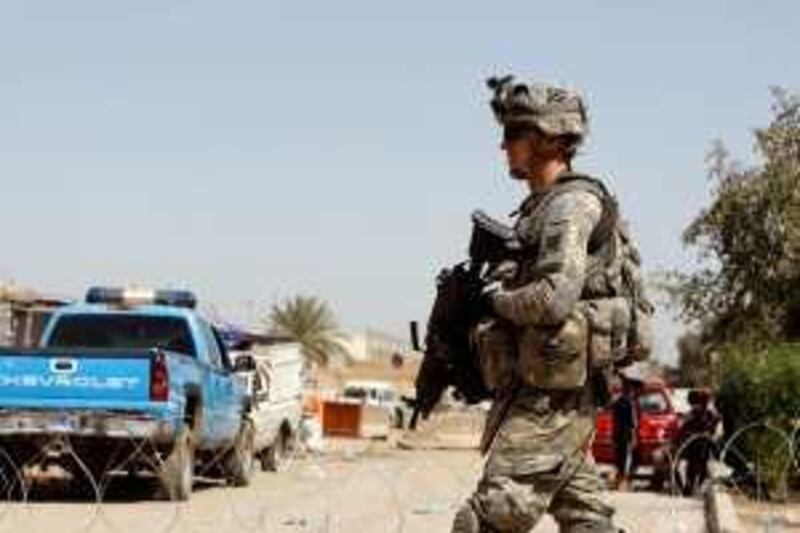Damascus // Syria has set up a new Iraq policy group to ensure its interests are safeguarded and that Iraq remains stable as US troops withdraw, according to officials and analysts in Damascus.
They said the move is part of an organised effort by the Syrian authorities to take a positive and active role in Iraqi politics, at a time when intense negotiations to form a new government in Baghdad are under way and with US influence there on the wane. Saudi Arabia and Iran, two major regional powers bordering Iraq, have been a focal point for talks between competing Iraqi factions since the March 7 elections. Damascus, a crucial player in regional politics, is keen not to be overshadowed by Tehran and Riyadh.
"The Syrian government has taken a decision since the [Iraq] election to be involved in the establishment of the Iraqi government," said a Syrian official, on condition of anonymity. He compared Syria's potential standing in Iraq to its position in Lebanon. Damascus has wielded strong influence over Beirut - controversially backing Hizbollah - and has played a central role in the formation of governments from the fractured Lebanese political landscape.
Since the US-led invasion of 2003, Syria has been accused by Washington of playing a malign role in Iraq, channelling in foreign fighters and Uslamist extremists. More recently the Iraqi government too has accused Damascus of supporting insurgents, allegations that severely damaged relations between the two capitals. Syria has always denied the allegations and, while acknowledging that militants have crossed from its territory into Iraq, insists it too is waging a war against al Qa'eda-style radicals and has done all it can to secure the long, porous desert border.
Critics accuse Damascus of playing both sides, stoking hard-line Islamist sentiment to oppose the US presence next door while trying to suppress the same trends at home. As part of a diplomatic re-engagement with Syria, launched by the Obama administration, a series of US delegations have held talks with their counterparts in Damascus on the issue of Iraqi security, hoping to enlist them in stabilisation efforts.
The Syrian government's decision to set up a new Iraq policy forum is, in part, a response to that, according to the Syrian official. "Our role in Iraq is not simply coming from a Syrian perspective, it is also a reflection of western and American requests," he said. "The Americans and the Europeans have asked for our help to fix the situation in Iraq and to pave the way for a US withdrawal. "Now Iran is involved in Iraq, so are Saudi Arabia and Syria. The time of America trying to put Iraq into its pocket is now over."
The 2003 invasion of Iraq and subsequent regional developments, particularly the assassination of Rafik Hariri, a former Lebanese prime minister, two years later, placed huge pressures on the Syrian president, Bashar Assad. For a time there was even talk of a Washington-enforced regime change in Syria. These hostile conditions gave Damascus every incentive to work against the Americans in Iraq, and to centre its strategic policy on the goal of having US troops withdrawn.
Those advocating violent resistance maintain the United States would have effectively colonised Iraq, if not for the opposition of insurgent forces. With the Syrian regime now more confident in its own position and certain the US is trying to cut its military presence in Iraq, the policy aims of Damascus and Washington regarding Baghdad have moved into closer alignment. "Syria wants to see the US out of Iraq, but at the same time wants to safeguard Iraqi unity," said Mazen Bilal, a Syrian journalist and political commentator. "It's impossible for Syria to isolate itself from Iraq and now Damascus is looking to play a constructive role."
He said he was "certain" there had been a US-Syrian agreement over the renewed political engagement and that there was a "clear vision" behind Syria's new strategy, rather than the more improvised one that previously dominated. Another Syrian analyst said he expected Damascus to use its influence over Baathist insurgent groups to aid national reconciliation efforts in Iraq, and to help suppress any resurgence in violence.
Damascus can also argue it is the only outside party able to access all strands of Iraqi opinion, with close links to radical Shiites, radical Sunnis and the various shades in between. There are unconfirmed reports in Syria that the Iraqi prime minister, Nouri al Maliki, has given assurances that a personal rift between him and Mr Assad would be patched up were he to be re-elected. Relations between Baghdad and Damascus have been frozen since Mr al Maliki accused Syria of harbouring the insurgents behind a string of bombings last year.
Results from Iraq's March 7 elections gave Iraqiyya, led by Ayad Allawi, a narrow lead over his closet rival, Mr al Maliki. Those final tallies have yet to be confirmed by the Supreme Court and are being contested by the State of Law coalition, which finished in second place. It remains unclear what form the Iraqi government will take, although there have been growing calls for a national unity alliance, comprising all of the major factions.
Negotiations are ongoing and have involved heavy regional shuttle diplomacy. "This time the Iraqi government is being formed with a view to its place in the region," the Syrian official said. "It is being formed in part in Tehran, in Riyadh and Damascus. But it is surely not being formed in the White House." @Email:psands@thenational.ae





